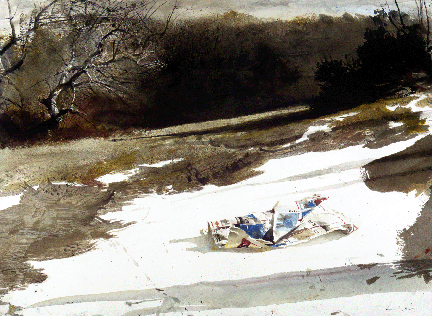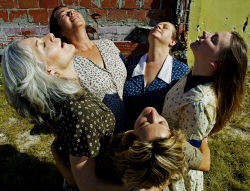Eric Gibson, my editor at The Wall Street Journal, called at noon to ask whether I’d be willing to write a last-minute “Sightings” column about Andrew Wyeth for Saturday’s paper. I agreed, went to work, and sent in the new column five minutes ago. It will replace my originally scheduled column on Israel’s informal ban on public performances of the music of Richard Wagner, which will run on January 31, two weeks from tomorrow.
As usual, pick up a copy of Saturday’s paper to see what I have to say.
UPDATE: Here’s an excerpt:
At a time when the vast majority of serious American art critics believed abstraction to be the One Best Way to paint, it was hugely irksome that America’s most successful painter should have been firmly committed not just to representation, but to near-photographic realism. Why did the benighted masses insist on preferring “Christina’s World” to the drips and spatters of Jackson Pollock? The answer was self-evident, at least to the art-world commentariat: Most people are stupid.
Today we live under the aspect of postmodernism, which holds all styles of art to be equal. Pollock’s once-shocking innovations have long since become the stuff wallpaper designs are made of. Does this mean that Andrew Wyeth’s conservative realism is now destined to become posthumously cool, the art-world equivalent of lounge music? Or is there something about his work that will forever fail to pass critical muster?
I don’t claim to be an infallible prophet of cultural fashion, but I suspect that once the shouting dies down, Wyeth’s oeuvre will undergo at least a partial revaluation, and that it will center on his watercolors….
Read the whole thing here.

 I said my piece about America’s most popular painter
I said my piece about America’s most popular painter  A cross between “Three Sisters” and “The Glass Menagerie,” “Dancing at Lughnasa” is a semi-autobiographical memory play whose narrator (Chris Clavelli) tells what happened to his family during two summer days in 1936. Young Michael lives in a cottage with Chris (Rachel Burttram), his unmarried mother, and her four sisters, all of whom are barely making ends meet. The longings and frustrations of the Mundy sisters have grown too great to bear, and what was once a close-knit family is now–like Europe itself–on the verge of disintegration. The genius of “Dancing at Lughnasa” is that Mr. Friel has portrayed this sunset hour with the lightest of comic touches, letting the audience laugh as the black shadows that surround the Mundys grow imperceptibly longer.
A cross between “Three Sisters” and “The Glass Menagerie,” “Dancing at Lughnasa” is a semi-autobiographical memory play whose narrator (Chris Clavelli) tells what happened to his family during two summer days in 1936. Young Michael lives in a cottage with Chris (Rachel Burttram), his unmarried mother, and her four sisters, all of whom are barely making ends meet. The longings and frustrations of the Mundy sisters have grown too great to bear, and what was once a close-knit family is now–like Europe itself–on the verge of disintegration. The genius of “Dancing at Lughnasa” is that Mr. Friel has portrayed this sunset hour with the lightest of comic touches, letting the audience laugh as the black shadows that surround the Mundys grow imperceptibly longer.